Module1How to learn English Unit1Unit 1 Let's try to speak English as much as possible.教学课件(56张)
文档属性
| 名称 | Module1How to learn English Unit1Unit 1 Let's try to speak English as much as possible.教学课件(56张) | 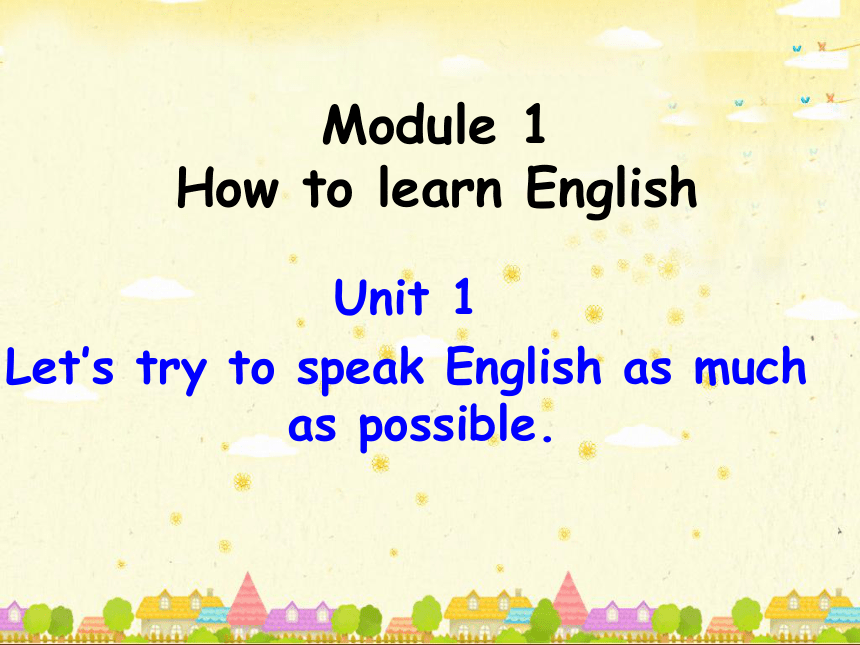 | |
| 格式 | zip | ||
| 文件大小 | 4.0MB | ||
| 资源类型 | 教案 | ||
| 版本资源 | 外研版 | ||
| 科目 | 英语 | ||
| 更新时间 | 2014-02-14 10:17:45 | ||
图片预览

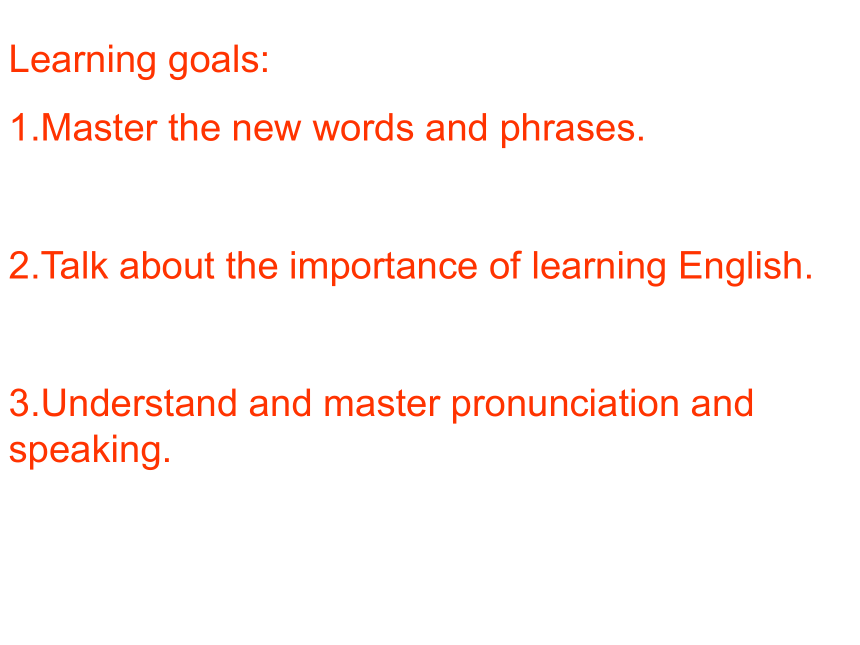
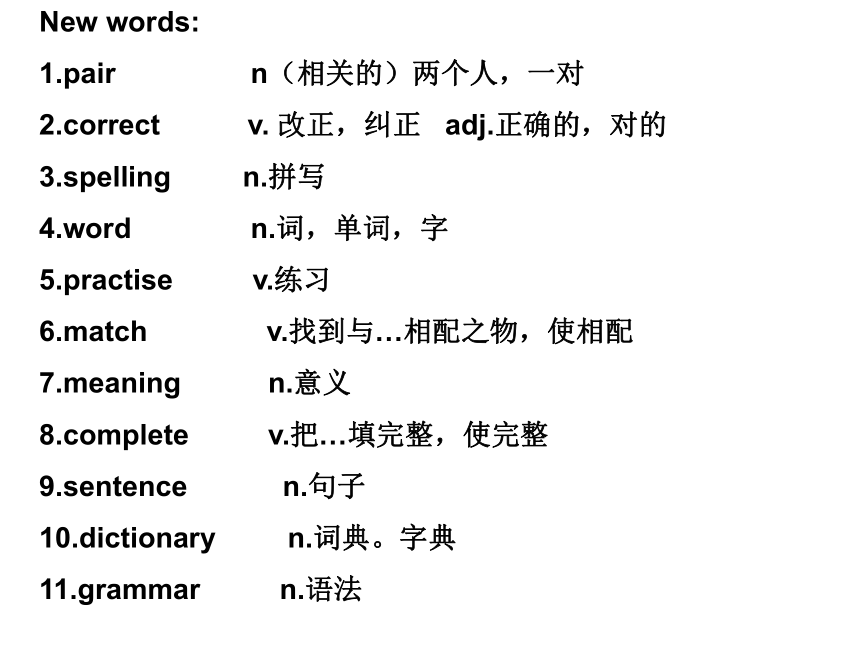
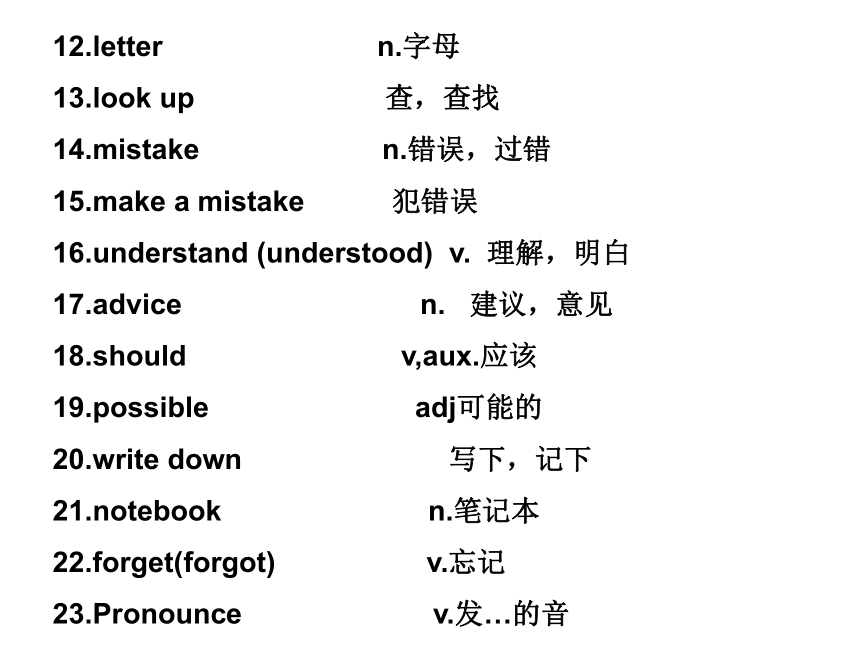
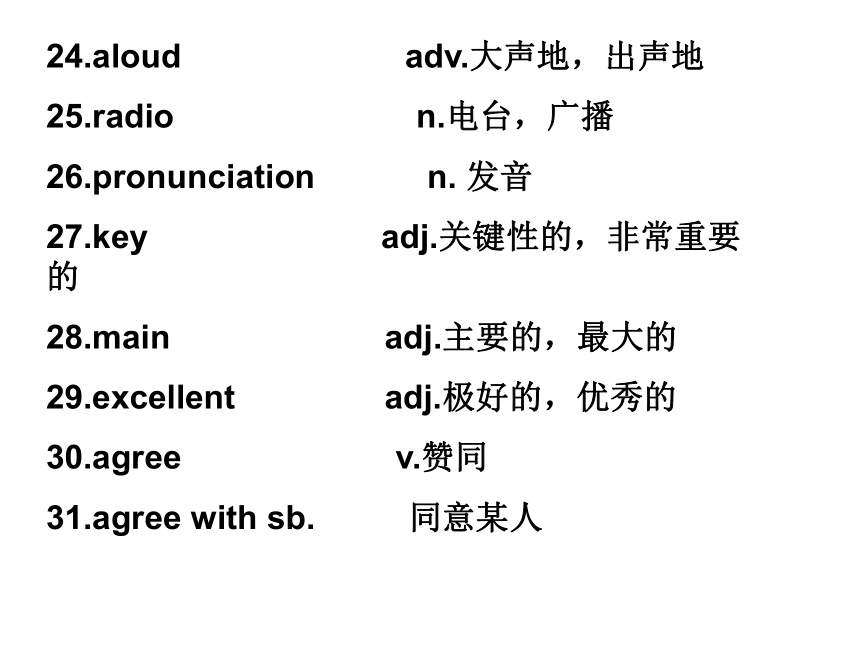




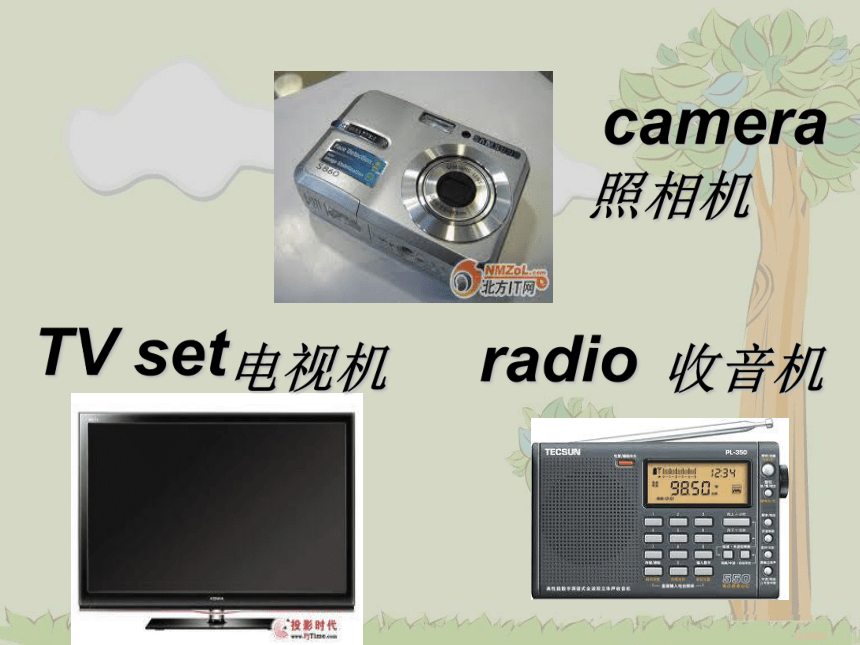


文档简介
课件56张PPT。Module 1
How to learn EnglishUnit 1
Let’s try to speak English as much as possible.Learning goals:
1.Master the new words and phrases.
2.Talk about the importance of learning English.
3.Understand and master pronunciation and speaking.New words:
1.pair n(相关的)两个人,一对
2.correct v. 改正,纠正 adj.正确的,对的
3.spelling n.拼写
4.word n.词,单词,字
5.practise v.练习
6.match v.找到与…相配之物,使相配
7.meaning n.意义
8.complete v.把…填完整,使完整
9.sentence n.句子
10.dictionary n.词典。字典
11.grammar n.语法
12.letter n.字母
13.look up 查,查找
14.mistake n.错误,过错
15.make a mistake 犯错误
16.understand (understood) v. 理解,明白
17.advice n. 建议,意见
18.should v,aux.应该
19.possible adj可能的
20.write down 写下,记下
21.notebook n.笔记本
22.forget(forgot) v.忘记
23.Pronounce v.发…的音24.aloud adv.大声地,出声地
25.radio n.电台,广播
26.pronunciation n. 发音
27.key adj.关键性的,非常重要的
28.main adj.主要的,最大的
29.excellent adj.极好的,优秀的
30.agree v.赞同
31.agree with sb. 同意某人6 newspapermagazineinternet--Where can we see English in our daily life? 报纸/′nju:zpeip?/杂志互联网7radioAustralian Broad-
casting CompanyBritish Broadca
-sting Company电台澳洲广播电台英国国家广播公司/′re?di??/8China Radio International Voice of AmericaCRI美国之音Special EnglishStandard English特别英语标准英语9TV station电视台10radioTV setcamera照相机电视机收音机11computermobile phonetelephone手机电话电脑12VCDcalculator…and so on.计算器等等13现在全世界共有50多个国家和地区把英文作为官方语言.--People from more than
50 countries speak English.--Which country is
English spoken in?14the UK 这些国家和地区曾经是英国殖民地. 英国 15Canada New York
北美洲 : 纽约
加拿大USA16大洋洲:Australia New Zealand 澳大利亚 新西兰 17Hong Kong 亚洲:Singapore 香港新加坡 18PhilippinesMalaysia 马来西亚菲律宾 19India Pakistan 印度 巴基斯坦 20Ireland 爱尔兰 欧洲:21…and so on.非洲:South Africa南非 1. Do you like English? 2. How do you learn English?3. Do you think it’s difficult to learn
English? Why?
4.What’s the most difficult things in learning English?English is very important and useful.Englishs____ingl____ingr___ingw__ingisteneadpeakritHow do people usually learn English?Englishletters____ingl____ingr___ingw__ingisteneadpeakritTo study English, what will they learn at first? Englishsentencevocabularypronunciationlettergrammarpunctuations____ingl____ingr___ingw__ingisteneadpeakritWhat else do they need to learn?Part1:read the instructions and check(∨)the ones you understand.
1.Work in pairs. Ask and answer the questions .□
2.Correct the spelling. □
3.Listen and check the words you hear. □
4.Practise saying the words. □
5.Match the words with their meanings. □
6.Complete the sentences with the words in the box. □
Part2 listen and answer the questions.Use the words and expressions in the box.
dictionary grammar letter look up make a mistake understand1.Which word did Daming not understand?
2.What mistake did Lingling make?
3.How does Dming usually check the spelling of a word?
4.Why was it difficult for Daming to check the spelling of cinema?Read and try to tell how to
learn English well according
to the dialogue.What advice can you hear ?What advice can you hear?1.You should always speak English in class!2.You should write down your mistakes in your notebooks!What advice can you hear?3.Why don’t you write down the correct spelling and grammar next to the mistakes?What advice can you hear?4. It’s a good idea to check your vocabulary notebook every day!What advice can you hear?5. How about listening to the radio or reading a newspaper in English? But try not to translate every word.What advice can you hear?6.I think everyone should have a pen friend and write email messages to each other.Read and fill in the blanks. J: You ______ always speak English in class. And you _______ write down your mistakes in your notebooks. And _________ you write down the correct spelling and grammar next to the mistakes? What else?
L: It’s __________ to check your vocabulary notebook every day.
J: That’s a good idea. Thanks a lot, Lingling. __________ listening to the radio or reading a newspaper in English? But ________ to translate every word.
L: I think everyone ________ have a pen friend and write email messages to each other. I’m going to meet my pen friend in Beijing this term.shouldshouldwhy don’ta good ideaHow abouttry notshouldNow let’s do some exercise.1.You should always speak English in class.advice(建议,不可数n.)should ﹢动词原型 -- “ 应该做某事”Eg. He should come here early.shouldn’t= should notEg. We shouldn’t watch TV a lot.Let’s practiceHe often gets up late.He _______ _______ up early.should getI watch TV all the time.You __________ ________ TV
all the time.shouldn’t watch(一直)He had an accident.He _________ ______ more careful.should beMr Li drives too fast.He _________ _______ too fast.shouldn’t driveHe ________ _______ slowly.should driveTao Tao plays computer games every day.He __________ ______ computer games every day.shouldn’t playBshould/ speak English / in class1.You ____________________________. Try to…should speak English in class.2. ____________________________.Try to speak English in class.3. ______________speak Chinese in class.Try not toAshould, Listen to the teacher carefullyYou should_______________________. listen to the teacher carefully
Try to…Try to listen to the teacher carefully.Try to do sth
尽力去做某事Try not to do sth
尽量不要去做某事2.Why don’t you write it down?adviceWhy don’t you ﹢动词原型 “为什么不… ”Eg. Why don’t you go to school?
= Why not go to school?
= Why not ﹢动词原型(写下来)I can’t get any fish.Why not go to the market?Why don’t we watch a film?Let’s go for a walk.I don’t know the way.Why not follow me?I’m feeling bad, baby.Why not see a doctor?Why don’t we watch a film?That’s a good idea.表示提建议的句型有:How/What about … ?
Would you like … ?
Let’s …
Why don’t you…?
Why not…?
You should/shouldn't …
It's a good idea to do.....doing sth.to do sth. do sth.常用的回答是:That’s a good/great idea.
OK./ All right.Do some exercises:1. Fill in the blanks: (1) She should (go) to school early. go (2) Why don’t you (play) basketball? play(3) How about (eat) noodles?eating (4) There are five (mistake) in your homework. (5) She is going to (help) his father.(6) It’s a good idea to (get) up early.(7) He (play) football very well.(8) My mother has six (pen friend).mistakeshelpgetplayspen friends1. A: Do you like English?
B: Yes, why?
A: _______ listen to an English song after class!
B: ________.
2. A: What are you going to do this evening?
B; I think I will stay at home.
A: ___________________ watch an English film with me?
B: ______________.
3. A: This English article is difficult.
B: ____________________ choose an easier one?Choose the words to complete the dialogue:Good idea. Why don’t you, What else, Let’s Why not
How about, practice speaking, OK, Excellent! All rightLet’s Good idea./OK./Excellent./All rightWhy don’t you/Why not Good idea./OK./Excellent./All rightWhy don’t you/Why not 4. A: How can I speak English well.
B: You should often _______________ English
5. A: _____________________ write down the correct words next to the mistakes?
B: ________.
6. A: Mum, I have swept the floor,_________ should I do?
B: That’s OK. Thank you.
7. A: ___________________ talking to our foreign teacher?
B: _________.
8. A: I’m not good at English.
B: _____________________ speak more English in class and listen to the teacher carefully?
A: ___________, I will.practice speaking Why don’t you/Why not Good idea./OK./Excellent./All rightWhat else What about/How about Good idea./OK./Excellent/All right.Why don’t you/Why not OK/All rightListen and repeat.1. Follow the tape to read the sentences: (1) Why don’t you write it down? (2) What else? (3) That’s a good idea. (4) Thanks a lot. 2. In pairs, read the dialogue loudly. Homework 1.copy and learn the new words by heart.
2. Write five new advice about learning English well. 3.Write a short passage about how to
learn English well in your exercisebook.
Let’s try to speak English as much as possible.Learning goals:
1.Master the new words and phrases.
2.Talk about the importance of learning English.
3.Understand and master pronunciation and speaking.New words:
1.pair n(相关的)两个人,一对
2.correct v. 改正,纠正 adj.正确的,对的
3.spelling n.拼写
4.word n.词,单词,字
5.practise v.练习
6.match v.找到与…相配之物,使相配
7.meaning n.意义
8.complete v.把…填完整,使完整
9.sentence n.句子
10.dictionary n.词典。字典
11.grammar n.语法
12.letter n.字母
13.look up 查,查找
14.mistake n.错误,过错
15.make a mistake 犯错误
16.understand (understood) v. 理解,明白
17.advice n. 建议,意见
18.should v,aux.应该
19.possible adj可能的
20.write down 写下,记下
21.notebook n.笔记本
22.forget(forgot) v.忘记
23.Pronounce v.发…的音24.aloud adv.大声地,出声地
25.radio n.电台,广播
26.pronunciation n. 发音
27.key adj.关键性的,非常重要的
28.main adj.主要的,最大的
29.excellent adj.极好的,优秀的
30.agree v.赞同
31.agree with sb. 同意某人6 newspapermagazineinternet--Where can we see English in our daily life? 报纸/′nju:zpeip?/杂志互联网7radioAustralian Broad-
casting CompanyBritish Broadca
-sting Company电台澳洲广播电台英国国家广播公司/′re?di??/8China Radio International Voice of AmericaCRI美国之音Special EnglishStandard English特别英语标准英语9TV station电视台10radioTV setcamera照相机电视机收音机11computermobile phonetelephone手机电话电脑12VCDcalculator…and so on.计算器等等13现在全世界共有50多个国家和地区把英文作为官方语言.--People from more than
50 countries speak English.--Which country is
English spoken in?14the UK 这些国家和地区曾经是英国殖民地. 英国 15Canada New York
北美洲 : 纽约
加拿大USA16大洋洲:Australia New Zealand 澳大利亚 新西兰 17Hong Kong 亚洲:Singapore 香港新加坡 18PhilippinesMalaysia 马来西亚菲律宾 19India Pakistan 印度 巴基斯坦 20Ireland 爱尔兰 欧洲:21…and so on.非洲:South Africa南非 1. Do you like English? 2. How do you learn English?3. Do you think it’s difficult to learn
English? Why?
4.What’s the most difficult things in learning English?English is very important and useful.Englishs____ingl____ingr___ingw__ingisteneadpeakritHow do people usually learn English?Englishletters____ingl____ingr___ingw__ingisteneadpeakritTo study English, what will they learn at first? Englishsentencevocabularypronunciationlettergrammarpunctuations____ingl____ingr___ingw__ingisteneadpeakritWhat else do they need to learn?Part1:read the instructions and check(∨)the ones you understand.
1.Work in pairs. Ask and answer the questions .□
2.Correct the spelling. □
3.Listen and check the words you hear. □
4.Practise saying the words. □
5.Match the words with their meanings. □
6.Complete the sentences with the words in the box. □
Part2 listen and answer the questions.Use the words and expressions in the box.
dictionary grammar letter look up make a mistake understand1.Which word did Daming not understand?
2.What mistake did Lingling make?
3.How does Dming usually check the spelling of a word?
4.Why was it difficult for Daming to check the spelling of cinema?Read and try to tell how to
learn English well according
to the dialogue.What advice can you hear ?What advice can you hear?1.You should always speak English in class!2.You should write down your mistakes in your notebooks!What advice can you hear?3.Why don’t you write down the correct spelling and grammar next to the mistakes?What advice can you hear?4. It’s a good idea to check your vocabulary notebook every day!What advice can you hear?5. How about listening to the radio or reading a newspaper in English? But try not to translate every word.What advice can you hear?6.I think everyone should have a pen friend and write email messages to each other.Read and fill in the blanks. J: You ______ always speak English in class. And you _______ write down your mistakes in your notebooks. And _________ you write down the correct spelling and grammar next to the mistakes? What else?
L: It’s __________ to check your vocabulary notebook every day.
J: That’s a good idea. Thanks a lot, Lingling. __________ listening to the radio or reading a newspaper in English? But ________ to translate every word.
L: I think everyone ________ have a pen friend and write email messages to each other. I’m going to meet my pen friend in Beijing this term.shouldshouldwhy don’ta good ideaHow abouttry notshouldNow let’s do some exercise.1.You should always speak English in class.advice(建议,不可数n.)should ﹢动词原型 -- “ 应该做某事”Eg. He should come here early.shouldn’t= should notEg. We shouldn’t watch TV a lot.Let’s practiceHe often gets up late.He _______ _______ up early.should getI watch TV all the time.You __________ ________ TV
all the time.shouldn’t watch(一直)He had an accident.He _________ ______ more careful.should beMr Li drives too fast.He _________ _______ too fast.shouldn’t driveHe ________ _______ slowly.should driveTao Tao plays computer games every day.He __________ ______ computer games every day.shouldn’t playBshould/ speak English / in class1.You ____________________________. Try to…should speak English in class.2. ____________________________.Try to speak English in class.3. ______________speak Chinese in class.Try not toAshould, Listen to the teacher carefullyYou should_______________________. listen to the teacher carefully
Try to…Try to listen to the teacher carefully.Try to do sth
尽力去做某事Try not to do sth
尽量不要去做某事2.Why don’t you write it down?adviceWhy don’t you ﹢动词原型 “为什么不… ”Eg. Why don’t you go to school?
= Why not go to school?
= Why not ﹢动词原型(写下来)I can’t get any fish.Why not go to the market?Why don’t we watch a film?Let’s go for a walk.I don’t know the way.Why not follow me?I’m feeling bad, baby.Why not see a doctor?Why don’t we watch a film?That’s a good idea.表示提建议的句型有:How/What about … ?
Would you like … ?
Let’s …
Why don’t you…?
Why not…?
You should/shouldn't …
It's a good idea to do.....doing sth.to do sth. do sth.常用的回答是:That’s a good/great idea.
OK./ All right.Do some exercises:1. Fill in the blanks: (1) She should (go) to school early. go (2) Why don’t you (play) basketball? play(3) How about (eat) noodles?eating (4) There are five (mistake) in your homework. (5) She is going to (help) his father.(6) It’s a good idea to (get) up early.(7) He (play) football very well.(8) My mother has six (pen friend).mistakeshelpgetplayspen friends1. A: Do you like English?
B: Yes, why?
A: _______ listen to an English song after class!
B: ________.
2. A: What are you going to do this evening?
B; I think I will stay at home.
A: ___________________ watch an English film with me?
B: ______________.
3. A: This English article is difficult.
B: ____________________ choose an easier one?Choose the words to complete the dialogue:Good idea. Why don’t you, What else, Let’s Why not
How about, practice speaking, OK, Excellent! All rightLet’s Good idea./OK./Excellent./All rightWhy don’t you/Why not Good idea./OK./Excellent./All rightWhy don’t you/Why not 4. A: How can I speak English well.
B: You should often _______________ English
5. A: _____________________ write down the correct words next to the mistakes?
B: ________.
6. A: Mum, I have swept the floor,_________ should I do?
B: That’s OK. Thank you.
7. A: ___________________ talking to our foreign teacher?
B: _________.
8. A: I’m not good at English.
B: _____________________ speak more English in class and listen to the teacher carefully?
A: ___________, I will.practice speaking Why don’t you/Why not Good idea./OK./Excellent./All rightWhat else What about/How about Good idea./OK./Excellent/All right.Why don’t you/Why not OK/All rightListen and repeat.1. Follow the tape to read the sentences: (1) Why don’t you write it down? (2) What else? (3) That’s a good idea. (4) Thanks a lot. 2. In pairs, read the dialogue loudly. Homework 1.copy and learn the new words by heart.
2. Write five new advice about learning English well. 3.Write a short passage about how to
learn English well in your exercisebook.
同课章节目录
- Module 1 How to learn English
- Unit 1 Let's try to speak English as much as possi
- Unit 2 You should smile at her.
- Unit 3 Language in use .
- Module 2 My home town and my country
- Unit 1 It's taller than many other buildings.
- Unit 2 Cambridge is a beautiful city in the east o
- Unit 3 Language in use .
- Module 3 Sports.
- Unit 1 Nothing is more exciting than playing tenni
- Unit 2 This year we training more carefully.
- Unit 3 Language in use .
- Module 4 Planes, ships and trains .
- Unit 1 He lives the farthest from school.
- Unit 2 What is the best way to travel.
- Unit 3 Language in use .
- Module 5 Lao She Teahouse.
- Unit 1 I wanted to see the Beijing Opera.
- Unit 2 It descibes the changes in Chinese society.
- Unit 3 Language in use .
- Module 6 Animals in danger.
- Unit 1 It allows people to get closer to them .
- Unit 2 The WWF is working hard to save them all.
- Unit 3 Language in use .
- Revision module A
- Module 7 A famous story
- Unit 1 Alice was sitting with her sister by the ri
- Unit 2 She was thinking about her cat.
- Unit 3 Language in use .
- Module 8 Accidents
- Unit 1 While the car were changing to red, a car s
- Unit 2 I was trying to pick it up when it bite me
- Unit 3 Language in use .
- Module 9 Population
- Unit 1 The population of China is about 1.37 billi
- Unit 2 Arnwick was a city with 200,000 people.
- Unit 3 Language in use .
- Module 10 The weathe
- Unit 1 It might snow.
- Unit 2 The weather is fine all year round.
- Unit 3 Language in use .
- Module 11 Way of life
- Unit 1 In China ,we open a gift later.
- Unit 2 In England, you usually drink tea with milk
- Unit 3 Language in use .
- Module 12 Help
- Unit 1 What should we do before help arrives?
- Unit 2 Stay away from windows and heavy furniture.
- Unit 3 Language in use .
- Revision module B
